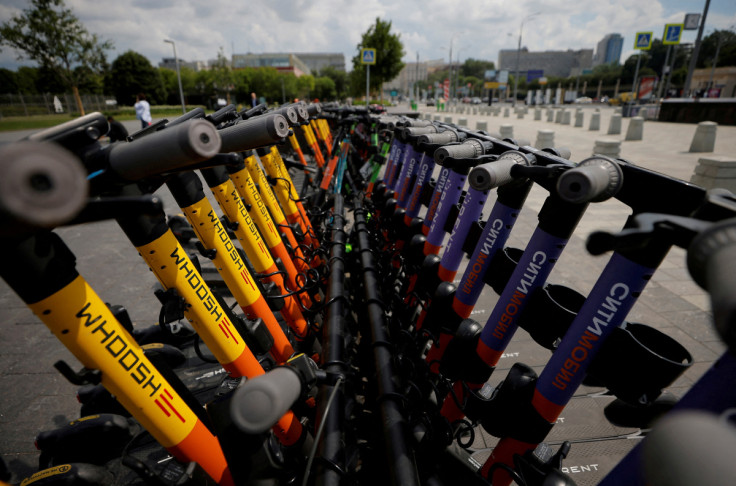Analysis-Whoosh Tests Russian IPO Interest As Foreign Investors Frozen Out

Corporate Russia is watching closely this week as electric scooter firm Whoosh braves Russian economic isolation with Moscow's first IPO since the country sent troops into Ukraine.
While breathing life into a moribund market, Whoosh's IPO could prove the exception as firms struggle to get close to valuations they once envisaged, bankers and strategists said.
Whoosh on Monday more than halved the size of its initial public offering (IPO) to $36.5 million from an earlier $80 million target, saying shareholders would not now sell shares.
With the large Western banks that usually underwrote IPOs to major institutional investors gone, companies now need to sell smaller volumes to largely retail investors.
"Western markets are closed, there is no Western money, maybe only from some friendly jurisdictions," Sergei Suverov, investment strategist at Aricapital Asset Management, said.
Russia saw a surge in IPOs in 2021, when retailer Fix Price raised almost $2 billion in a dual listing in London and Moscow. The decade-high of $3.7 billion raised in IPOs landed investment banks more than $100 million in fees, Refinitiv data shows.
But February's "special military operation" in Ukraine sparked a sell-off of Russian assets, wiping 42.5% off its stock market's capitalisation so far this year and making it difficult for companies to expand operations beyond Russia's borders.
"It is hardly worth expecting any large placements - of $1 billion or more. But there could be placements from $100 million to $300 million with a focus on retail," Suverov said.
LOCAL MONEY
Nevertheless, Whoosh will on Wednesday seek to raise funds with Russian investors starved of opportunities.
While some companies have been forced to rethink their plans, conditions may play in favour of Whoosh, which said it was seeing strong interest from "a wide range of retail investors" and "leading Russian investment funds".
Pent-up demand, partly because of a ban on trading foreign assets, could boost interest in a well-known consumer brand needing modest funds to expand in Russia and ex-Soviet states.
Whoosh executives have been marketing the company to Russian brokerages and answering investor queries.
One financial market source who worked on some 2021 IPOs said Whoosh's only option was to attract local money as sanctions have blocked Russia's access to Western financial services and a large source of funding.
In Fix Price's IPO, Russia's largest since sanctions were introduced in 2014, Russian investors accounted for around 10% of demand, with the U.S. supplying 40% and Britain a third.
Russia's listings were popular with Western funds seeking to tap into its risk-laden potential. But as the West shuns Russia over Ukraine, the post-Soviet corporate focus is shifting.
Whoosh has shelved expansion plans in Europe and jeweller Sokolov, which hopes to IPO in 2023, has moved its focus to China from Germany and is paying close attention to how the electric scooter firm fares.
"Many companies are looking at next year," Artem Sokolov, Sokolov's managing partner and co-owner, told Reuters. "We will wait for a window and if it appears, we will be ready to move promptly."
RETAIL RELIANCE
Russia is no stranger to retail IPO participation and in some smaller deals the Russian share of investors has been high.
SPB Exchange, Russia's second-largest bourse, floated in November 2021 with a focus on retail investors.
Cybersecurity firm Positive Technologies was forced to rejig plans last year and launched locally after it was put on a U.S. sanctions list and a Western-led group of banks dropped out.
The firm has since returned to equity capital markets, selling an additional 1.4% of shares at an SPO in September.
"One of the key changes of the last year is our investor profile has changed. Just a year ago we had American (and other) investment funds; now many Russian citizens have become investors," Yuri Maximov, co-founder and majority shareholder of Positive Technologies, said last month.
The number of retail investors using brokerage services in Russia is growing, reaching 27.3 million the third quarter, but the volume of funds held was down 32% year-on-year to 5.2 trillion roubles ($82.6 billion).
There is money, but mostly stashed under the bed, said Sergei Popov, managing director of NZT Rusfond, with investors wary of intense geopolitical uncertainty.
"The more companies that come out successfully, the better," said Popov, who works closely with retail investors.
($1 = 62.9500 roubles)
© Copyright Thomson Reuters 2024. All rights reserved.





















